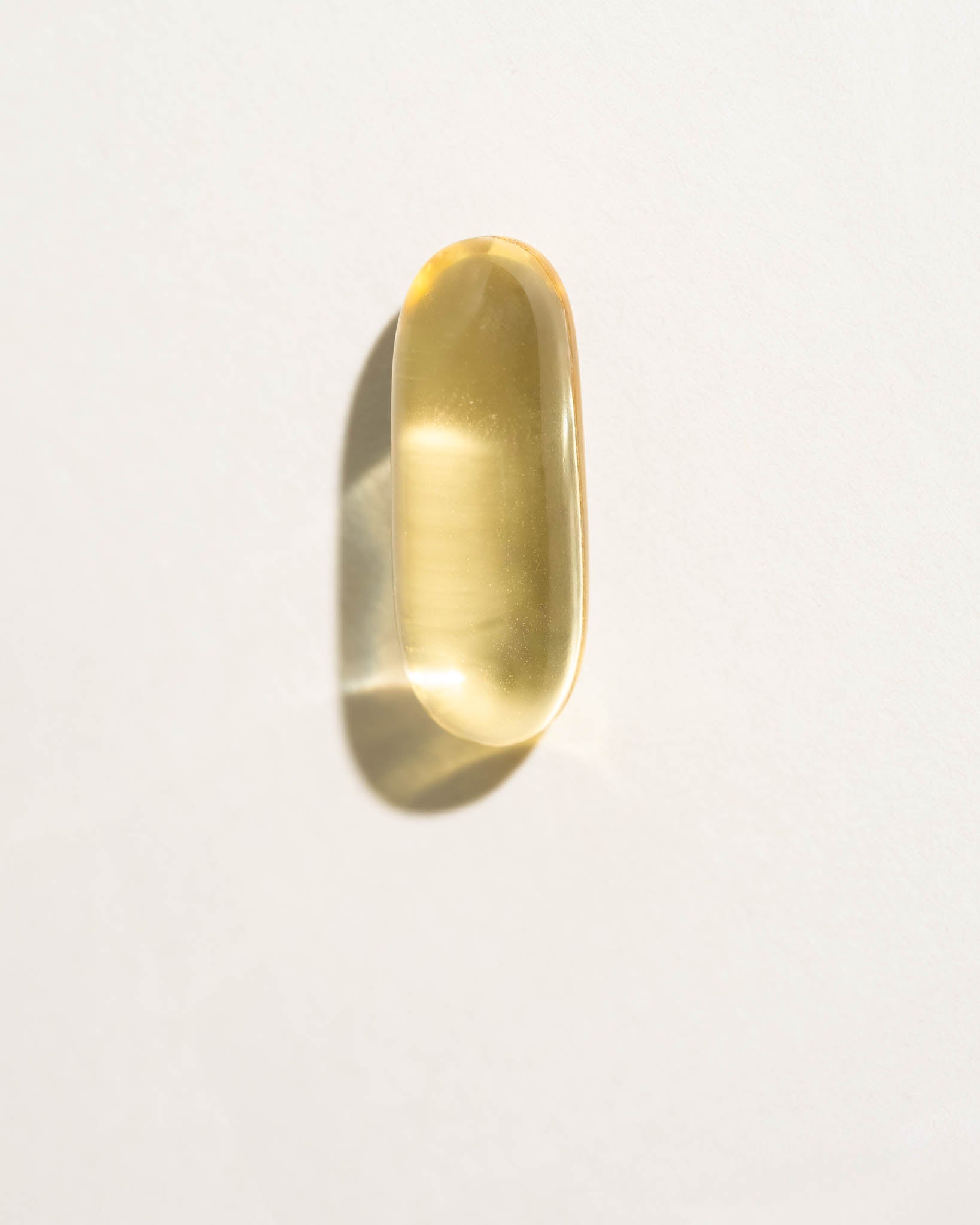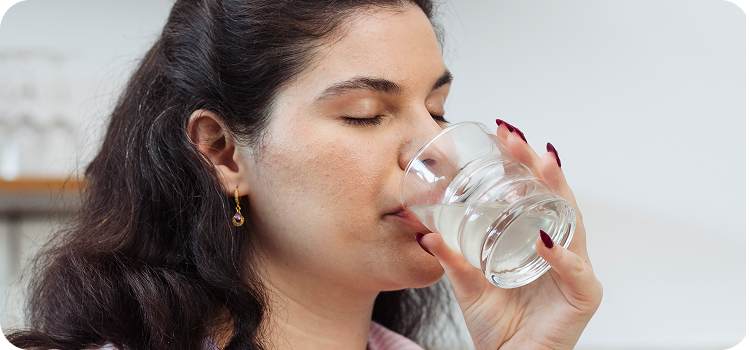Table of contents
If you have polycystic ovary syndrome (PCOS), you might experience chronic digestive issues such as bloating, alternating between diarrhoea and constipation, a swollen belly, gas, etc. If that sounds familiar, don’t worry—you’re not alone. A significant number of women with PCOS experience these kinds of problems.
In this article, we’ll explain the various potential causes of these digestive issues, their connection to PCOS, and, most importantly, how you can manage them in your daily life.
PCOS and chronic digestive issues: what are the causes?
Before diving into the details of the potential causes, let’s start with a quick reminder about PCOS. (Learn more about PCOS here →)
Polycystic ovary syndrome (PCOS) is a hormonal imbalance that can originate either from the ovaries or from the brain (central origin). It leads to the overproduction of male hormones (androgens), such as testosterone, but it’s not the only one. This rise in male hormones triggers various symptoms, including acne, excess hair growth (hirsutism), significant hair loss, irregular or absent menstrual cycles, weight gain or difficulty losing weight, fatigue, and more.
PCOS is usually accompanied by low-grade inflammation—a chronic and silent form of inflammation. This inflammation fuels the overproduction of male hormones, intensifying the various symptoms of PCOS. It also promotes insulin resistance, which can lead to complications such as type 2 diabetes.
Given this, reducing inflammation is one of the main ways to manage PCOS, and it’s through this inflammation that we’ll begin.
Low-grade inflammation
Scientific studies (2) have shown that women with PCOS often have low-grade inflammation, which is chronic yet silent.
While the exact mechanisms of this inflammation are not fully understood, many factors can trigger or exacerbate it, including poor lifestyle habits, certain medications, smoking, pollution, and endocrine disruptors.
This chronic inflammation can lead to a host of imbalances and symptoms, including digestive issues. It’s often worsened by intestinal permeability, which is itself caused by an imbalance in the gut microbiome.
👉 At SOVA, we’ve designed Ovastart, a patented myo-inositol and folate formula, specifically to support insulin sensitivity and hormonal balance — both key in reducing inflammation and improving digestive comfort in PCOS.
Gut microbiome imbalance
The primary cause of a leaky gut is an imbalance in the gut microbiome, a.k.a. dysbiosis.
The gut microbiome consists of all the living microorganisms (bacteria, viruses, parasites, and non-pathogenic fungi) found in the digestive system, primarily in the small intestine and colon. The gut microbiome is the most populous microbiome in the body, housing between 10^12 and 10^14 microorganisms. (4)
It plays a part in digestive, metabolic, immune, and neurological functions. An imbalanced microbiome can contribute to inflammatory or autoimmune diseases, which is why research in this area is growing.
Some studies have shown that women with PCOS have a less diverse gut microbiome than those considered healthy, with fewer subgroups of certain bacteria. A less diverse microbiome is less functional, which can lead to digestive symptoms.
Additionally, a relatively high percentage of women with PCOS experience insulin resistance. This resistance is linked with microbiome imbalances, obesity, type 2 diabetes, and cardiovascular risk.
👉 Supporting your gut microbiome with the right nutrition and supplements can make a difference. For example, our Sugar Balance formula combines berberine (known for its positive effect on blood sugar and gut health) with chromium and zinc to help regulate insulin resistance and ease bloating.
Irritable Bowel Syndrome (IBS)
IBS is a functional disorder of the intestines, characterised by abdominal pain and/or digestive discomfort, often linked to bowel movements or changes in stool. Common symptoms include bloating, a swollen belly, diarrhoea, constipation, or a mix of both. (8)
A doctor, typically a gastroenterologist or GP, diagnoses IBS using the Rome IV criteria.
IBS can be classified as type D (diarrhoea), type C (constipation), or a mix of both, alternating between diarrhoea and constipation.
Causes include:
-
Disturbed intestinal motility (too fast → diarrhoea, too slow → constipation)
-
Digestive hypersensitivity (greater pain perception from bloating/gas)
-
Dysbiosis (imbalances in gut bacteria, either quantitative or qualitative)
From this, we gather that all previously mentioned phenomena are interconnected, and multiple approaches will be necessary to get relief from pain.

Eating disorders
Eating disorders (EDs), such as anorexia, bulimia, and binge eating, can cause digestive issues like bloating, gas, and abdominal pain, often compounded by anxiety and disrupted eating patterns.
If you have or have had an eating disorder, it’s important to seek help from professionals such as dietitians, naturopaths, or psychologists to address the root causes.

Is there a link between PCOS and IBS?
While more research is needed, some links have been identified:
-
Hormones: Elevated LH and FSH in PCOS may slow food movement, leading to constipation. Fluctuating oestrogen and progesterone can also impact bowel movements.
-
Inflammation: Chronic inflammation, central in PCOS, contributes to IBS symptoms.
-
Intestinal permeability: A weakened intestinal barrier allows toxins and molecules to leak, fuelling digestive discomfort. (10)
Understanding these connections can help manage both PCOS and IBS symptoms more effectively.
What can be done to reduce digestive issues?
Adopt an anti-inflammatory diet
Here are some tips to limit inflammation:
-
Incorporate omega-3s: walnut, flaxseed, or rapeseed oil; fatty fish like mackerel and sardines; nuts; flaxseeds.
-
Boost antioxidants: turmeric, cinnamon, ginger, green tea, colourful veggies.
-
Supplement wisely: vitamin D, curcumin, omega-3s.
👉 If you’re struggling to get enough omega-3s from your diet, our Omega-3 supplement is an easy way to boost your intake with high-quality, purified oils.
Balance your meals
Aim for a mix of carbohydrates, protein, vegetables, and healthy fats. Prioritise high-fibre carbs (whole grains, legumes).
Cut down on inflammatory foods: sugary snacks, animal dairy, red meats, sodas, alcohol, and gluten-rich products.
Support your gut microbiome
Balance and vary your diet, minimise inflammation, take probiotics, and consider glutamine to restore your gut lining.
👉 We’ve created a Balance Bundle that combines Ovastart and Sugar Balance — a duo especially recommended for women with PCOS who also experience digestive issues, bloating, or irregular cycles.
Promote digestive comfort
Certain foods (raw veggies, legumes, onions, garlic, whole grains) may worsen bloating depending on tolerance. Consider a low FODMAP protocol with professional guidance.
Managing stress
When you’re stressed, cortisol rises, promoting inflammation and digestive issues. Practices like breathing, yoga, meditation, or exercise help regulate this.
👉 Want to learn more about stress and PCOS? Check out our blog article where we deep dive into it.
Incorporating physical activity
Exercise stimulates digestion, reduces inflammation, and boosts mood-regulating hormones like serotonin and dopamine.
Other lifestyle tips
Stay hydrated (1.5–2L/day), get enough sleep, and listen to hunger/fullness cues.
👉 Not sure where to start? Take our free product quiz to discover which supplements best fit your symptoms — from bloating to fatigue, irregular cycles, or hair loss.
Lastly, if you’re struggling with digestive issues, seek professional support. Living with daily discomfort can lead to food anxiety or eating disorders. Don’t suffer in silence – solutions are available!
✨ Key takeaways:
-
PCOS and IBS are interconnected through inflammation, hormone imbalance, and gut microbiome diversity.
-
Diet, lifestyle, and stress management are central to reducing digestive issues.
-
Targeted supplements like Ovastart, Sugar Balance, and Omega-3 can support digestion, hormone balance, and inflammation reduction.
SOVA was created by two sisters with PCOS who wanted products that truly worked. Our formulas are developed in-house with women’s health and micronutrition experts, using ingredients backed by clinical studies and compliant with European regulations.
- Built by women with PCOS, we know the reality of the symptoms.
- Clinically studied, high-quality ingredients, including patented forms like Quatrefolic® and an optimal Myo-/D-Chiro Inositol ratio.
- Holistic support for hormonal balance, metabolic health, inflammation, mood and cycle regulation.
- Transparent, science-led formulas with no unnecessary additives.















